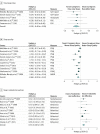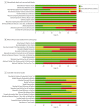Sleep Duration and Sleep Quality in Caregivers of Patients With Dementia: A Systematic Review and Meta-analysis
- PMID: 31441938
- PMCID: PMC6714015
- DOI: 10.1001/jamanetworkopen.2019.9891
Sleep Duration and Sleep Quality in Caregivers of Patients With Dementia: A Systematic Review and Meta-analysis
Abstract
Importance: In the United States, 16 million family caregivers provide long-term care for patients with dementia. Although one's physical, mental, and cognitive health depends on sleep, many caregivers experience chronic stress, and stress is typically associated with worse sleep quantity and quality.
Objective: To quantify the extent, nature, and treatability of sleep problems in dementia caregivers.
Data sources: PubMed and Scopus databases were systematically searched for articles published through June 2018 using the following keywords: caregiver or spouse or caretaker AND sleep or circadian AND dementia or Alzheimer. Backward citation tracking was performed, and corresponding authors were contacted for additional data to conduct meta-analyses and pooled analyses.
Study selection: Two reviewers independently screened 805 studies to identify those that reported sleep duration or sleep quality in caregivers of patients with dementia.
Data extraction and synthesis: Following the PRISMA guidelines, 2 reviewers independently extracted data from all studies and conducted National Heart, Lung, and Blood Institute study quality assessments. Meta-analyses with random-effects models were performed to evaluate sleep duration, sleep quality, and sleep interventions in dementia caregivers.
Main outcomes and measures: Sleep quality and total sleep time were measured by polysomnography, actigraphy, and self-report.
Results: Thirty-five studies were analyzed with data from 3268 caregivers (pooled mean age [SD of sample means], 63.48 [5.99] years; 76.7% female) were analyzed. Relative to age-matched control noncaregiver adults, caregivers had lower sleep durations akin to losing 2.42 to 3.50 hours each week (Hedges g = -0.29; 95% CI, -0.48 to -0.09; P = .01). Sleep quality was significantly lower in caregivers (Hedges g = -0.66; 95% CI, -0.89 to -0.42; P < .001), but caregivers who underwent sleep intervention trials had better sleep quality than caregivers who did not receive a sleep intervention (Hedges g = 0.35; 95% CI, 0.20-0.49; P < .001).
Conclusions and relevance: Sleep debt is known to have cumulative associations with physical, mental, and cognitive health; therefore, poor sleep quality in dementia caregivers should be recognized and addressed. Although the caregiving role is stressful and cognitively demanding by its nature, better sleep quality was observed in caregivers who received low-cost behavioral interventions.
Conflict of interest statement
Figures



References
-
- Prince M, Comas-Herrera A, Knapp M, Guerchet M, Karagiannidou M World Alzheimer report 2016: improving healthcare for people living with dementia: coverage, quality and costs now and in the future. http://eprints.lse.ac.uk/67858/. Published September 2016. Accessed November 25, 2018.
-
- Alzheimer’s Association 2018 Alzheimer’s disease facts and figures. Alzheimers Dement. 2018;14(3):367-429. doi:10.1016/j.jalz.2018.02.001 - DOI
Publication types
MeSH terms
Grants and funding
LinkOut - more resources
Full Text Sources
Medical

